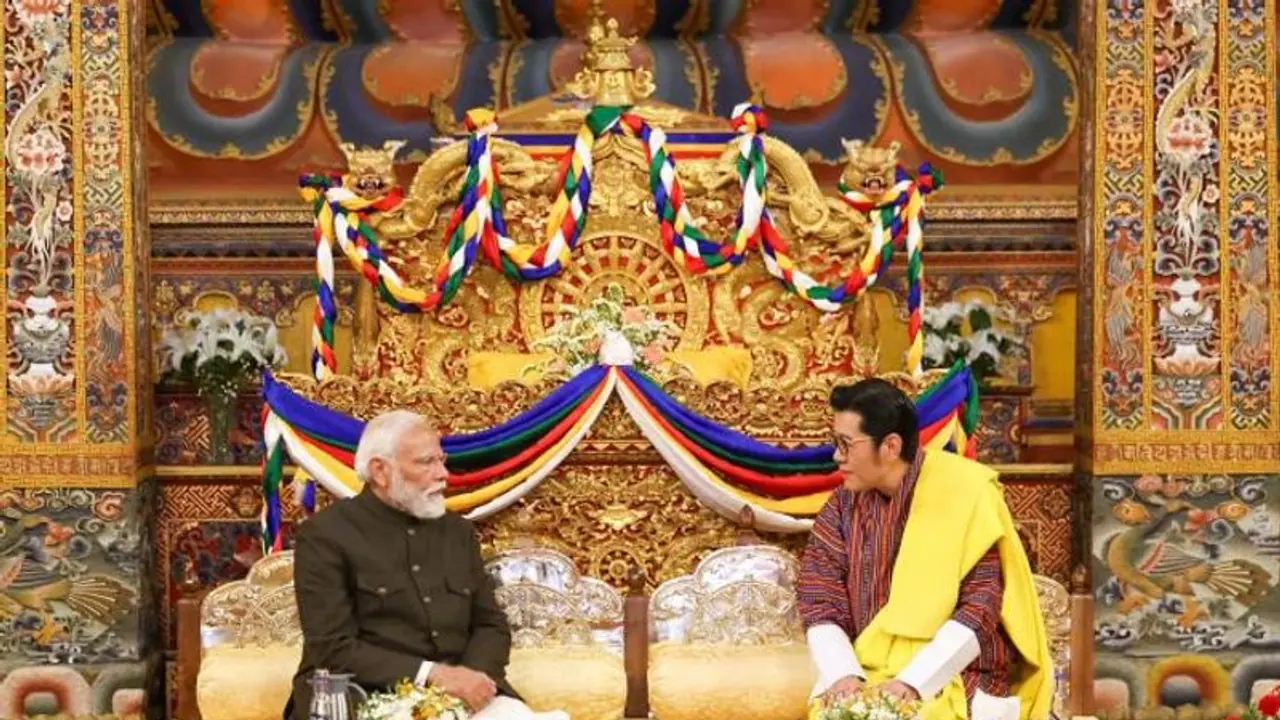Prime Minister Narendra Modi's visit holds significance in light of Bhutan's boundary dispute with China and concerns over Chinese encroachment in strategic areas. Asianet Newsable spoke to Major General Sudhakar Jee (Retd) to understand the sensitivity and security implications of the visit
Prime Minister Narendra Modi kept the tradition of regular high-level exchanges with Bhutan when he arrived in the capital Thimphu, on his Bhutanese counterpart Tshering Tobgay’s invitation. The visit reinforces New Delhi’s emphasis on its “Neighbourhood First Policy”. PM Modi's visit assumes significance amid the election process underway back home. Also days ago, the Bhutanese prime minister, who was in Delhi and Mumbai on a 5-day visit, extended an invitation to visit his country. This was his maiden foreign visit after assuming the charge of the Bhutanese prime minister's office.

Prime Minister Modi was originally scheduled to visit Bhutan on March 20-21 but had to postpone it by a day due to inclement weather over Paro airport in Bhutan.
Asianet Newsable spoke to defence and strategic affairs analyst, Major General Sudhakar Jee (Retd) to understand the importance of the short-notice visit. In simple terms, Sudhakar Jee said that this visit is “sensitive, security-oriented and significant.”
Ever since Bhutan and China inked a 'three-step roadmap' agreement to resolve their boundary dispute, in 2021, the development has ruffled feathers in Delhi. Since the contents of the agreement have yet not been unveiled, Thimphu and Beijing have so far held over 25 rounds of meetings at different levels to resolve the issue.
In the past, China had offered Bhutan an 'exchange' of the disputed territories. As part of the negotiations since the 1990s, Beijing has been offering to relinquish its demand over 495 square kilometres area in the north if Bhutan yields 298 square kilometres of its territory in the west (includes parts of Doklam 89 sq km, Charithang, Sinchulungpa, Dramana, and Shakhatoe) to China.
Sudhakar Jee said: "China getting into Jhampheri Ridge is not in India’s security interest and New Delhi should not accept any Chinese footprint in the region."

Why does China want its footprint in Jhampheri Ridge?
It must be noted that Bhutan has immense strategic significance for both its neighbours. In its north and northwest, there is China-controlled Tibet region, while it is surrounded on all other sides by India’s northeastern region.
The area around Jhampheri Ridge has strategic importance for India. The Doklam region is crucial for Delhi as it lies at the tri-junction between China, Bhutan and India. The distance between Jhampheri Ridge and the Siliguri corridor is just 17km. China’s People's Liberation Army would have an offensive advantage if they had access to the region.
During a war-like scenario, China can easily mobilise its troops and machines and choke the Siliguri corridor, a 22km-wide strip of land connecting mainland India to its northeastern region. In 2017, the armies of India and China were engaged in a standoff at Doklam for 72 days after India stopped the Chinese from constructing a road in the area.
After India and Bhutan signed the Indo-Bhutan Treaty of Peace and Friendship in 1949, New Delhi has been looking over Thimphu’s foreign policy and defence in exchange for security guarantees and economic support. In 2007, the treaty was revised to grant Bhutan more autonomy, but India still plays a major role in the latter’s external affairs.
PM Modi received an audience with the King of Bhutan, Jigme Khesar Namgyel Wangchuck, and the fourth king of Bhutan Jigme Singye Wangchuck. He is also scheduled to hold bilateral talks with his Bhutanese counterpart. He will inaugurate the Gyaltsuen Jetsun Pema Mother and Child Hospital in Thimphu, a state-of-the-art hospital, built with the assistance of the Government of India.
